
Hiram "Hank" Williams was a celebrated American singer, songwriter, and musician. He is regarded as one of the most significant and influential American singers and songwriters of the 20th century. Williams recorded 55 singles that reached the top 10 of the Billboard Country & Western Best Sellers chart, five of which were released posthumously, including 12 that reached No. 1, three of which were released after his death.

Randall Hank Williams, known professionally as Hank Williams Jr. or Bocephus, is an American singer-songwriter and musician. His musical style is often considered a blend of southern rock, blues, and country. He is the son of country musician Hank Williams and the father of musicians Holly Williams and Hank Williams III.
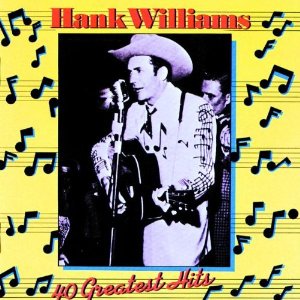
40 Greatest Hits is a two-record greatest hits compilation by American singer-songwriter Hank Williams. It was released in 1978 by Mercury Records – who under PolyGram became responsible for the MGM tape vault – on the 25th anniversary of Williams' death. Significantly, it was the first anthology in quite some time that did not subject Williams' recordings to either rechanneled stereo, posthumous overdubs, artificial duets with family members, or most or all of the above. Because of both this, and the value-for-money attraction of having a deeper song selection than single-disc compilations issued previously by MGM Records, many reviewers consider this anthology to be the perfect starting point for newcomers to Williams' recorded legacy. The album remains, to this day, the best-selling record of Williams' career.

The Lost Masters is the name given to an album project to release unheard, rare and extended remixes of songs by the British pop group Bucks Fizz. Two albums were originally released: The Lost Masters in 2006, and The Lost Masters 2 - The Final Cut in 2008. A third single-disc volume was released in April 2012 as a double-pack which included a re-release of the group's 1986 album Writing on the Wall. Finally, The Best of The Lost Masters, a 25-track compilation was released in April 2013, which also included a number of previously unreleased mixes.
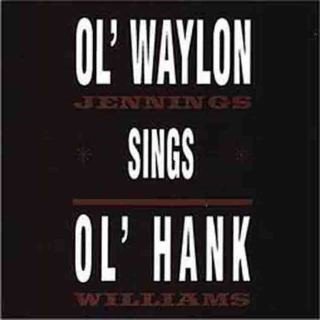
Ol' Waylon Sings Ol' Hank is an album by the American country music artist Waylon Jennings, released on the singer's own label, WJ Records, in 1992.

Nashville Rebel is a box set by Waylon Jennings, released on RCA Nashville through Legacy Recordings in 2006. According to Allmusic's Stephen Thomas Erlewine, it is "the first comprehensive, multi-label Waylon Jennings retrospective ever assembled," comprising ninety-two songs recorded between 1958 and 1994, with selections from the majority of the singer's recording career. The first track of the box set is the Buddy Holly-produced "Jole Blon," released in 1958, while the last is "I Do Believe," a song produced by Don Was that was included on The Highwaymen's 1995 release, The Road Goes on Forever. The other material on the box set covers Jennings' career chronologically, with songs ranging from his years on RCA's roster to later compositions from his short-lived stay at Epic Records; it ignores, however, the tracks from Jennings albums released on independent labels. The majority of the singer's charting singles are included in the package, as are collaborations such as "Mamas Don't Let Your Babies Grow Up to Be Cowboys" with Willie Nelson and "Highwayman" with The Highwaymen. A notable addition is the previously unreleased "The Greatest Cowboy of Them All," a 1978 duet with Johnny Cash which was later recorded by Cash alone for A Believer Sings the Truth (1979) and The Mystery of Life (1991); two others, "It's Sure Been Fun" and "People in Dallas Got Hair," had never been released in the United States. Nashville Rebel was released on four CDs, with a 140-page booklet and liner notes by Rich Kienzle and Lenny Kaye.

George Jones Salutes Hank Williams is the 1960 country music studio album released in May 1960 by George Jones. The album was the ninth studio LP release, and was recorded in one session. The album has been reissued multiple times since its release, including the tracks being reused on many compilations.

Your Cheatin' Heart is the second studio album by American musician Hank Williams Jr. The full title is: The MGM Sound Track Album Hank Williams' Life Story – The MGM Film Your Cheatin' Heart Sung by Hank Williams Jr. The album number is E/SE-4260.

Live at Cobo Hall is a live album by American musician Hank Williams Jr. The full title is Hank Williams Jr. Live at Cobo Hall Detroit. The album was issued by MGM Records as number SE 4644 and later re-issued by Polydor Records as 811 902–1.
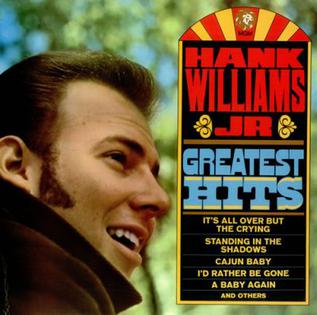
Greatest Hits is an album by American country music singer and songwriter Hank Williams Jr. The Album was issued by MGM Records as number SE 4656. It reached No. 7 on Billboard's chart of Country Albums in 1970.
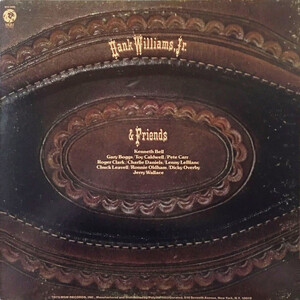
Hank Williams Jr. & Friends is the twenty-sixth studio album by Hank Williams Jr.
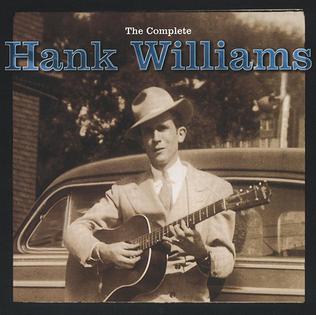
The Complete Hank Williams is a 1998 box set collecting almost all of the recorded works of country music legend Hank Williams, from his first recorded track in 1947 to the last session prior to his untimely death in 1953 at the age of 29. While a number of live and overdubbed songs are excluded, the ten disc collection contains 225 tracks, including studio sessions, live performances and demos. Among those 225 songs are 33 hit singles and 53 previously unreleased tracks.

The Bocephus Box is a box set of songs recorded by country music artist Hank Williams, Jr. Produced by Jimmy Guterman, it was originally released in 1992 by Capricorn Records, and re-released in 2000 by Curb Records, with a slightly different track list. The updated version replaces Guterman's liner notes with a set written by Williams.
"Long Gone Lonesome Blues" is a 1950 song by Hank Williams. It was Williams' second number-one single on the Country & Western chart. "Long Gone Lonesome Blues" stayed on the charts for 21 weeks, with five weeks at the top.
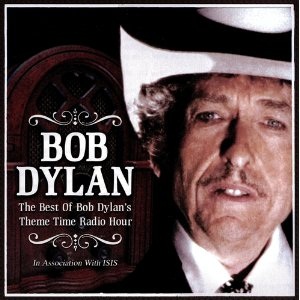
The Best of Bob Dylan's Theme Time Radio Hour is a series of four compilation albums featuring songs Bob Dylan played on his shows as a deejay on the XM Satellite Radio and Sirius XM Satellite Radio program, Theme Time Radio Hour, from May 2006 through April 2009. Each album in the series includes 52 songs on two CDs. The tracks cover the range of genres Dylan highlighted on the program, including blues, R&B, rockabilly, doo-wop, soul, jazz, rock-and-roll and country.
"I'm a Long Gone Daddy" is a country song written and recorded by Hank Williams. It was released in 1948 on MGM Records and became his second top ten hit.
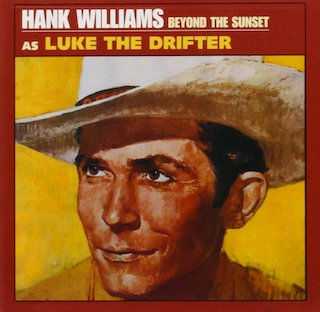
Hank Williams as Luke the Drifter is an LP by Hank Williams released by MGM Records in 1954. It features narrations that Williams released under the pseudonym Luke the Drifter.
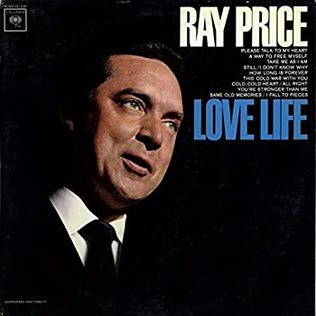
Love Life is a studio album by country music artist Ray Price. It was released in 1964 by Columbia Records.
















